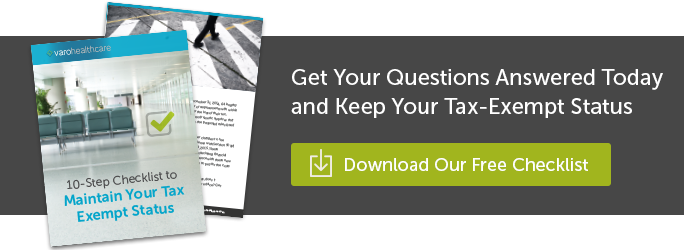To help understand the section of the 501(r) in regards to what hospitals can charge an uninsured patient, here is a quote from U.S. Senator Chuck Grassley (R-Iowa): “Tax-exempt hospitals don't have many measures of accountability for their special status. The law hasn't given them much direction, and so they've defined standards for themselves. Sometimes that's resulted in providing very little charitable patient care or other community benefits, failing to publicize charitable care to patients, charging indigent, uninsured patients more than insured patients, and using very aggressive collection practices... The provisions take steps to differentiate tax-exempt hospitals from for-profit hospitals and provide further transparency about tax-exempt hospitals' fulfilling their charitable mission. Congress, the IRS, and the public will now have additional tools and information to ensure that charitable hospitals act charitably.”

Regardless if you agree with Senator Grassley’s political views, in our “10-Step Checklist To Maintain Your Tax Exempt Status” item number 6 states: “We have put a limitation on charges to the amount generally billed.” Once free and discounted care has been factored in, charitable hospitals are still limited in what they can charge. Part of offering financial assistance for hospital patients will require you to determine the amount generally billed to insurers, and cap your charges there.
You are permitted to determine that amount by either looking back at your records, or by taking a proactive approach. In each case, you will have to designate the amount the hospital would generally be paid by insurance for the service, and charge no more than that to uninsured patients. This rule goes hand in hand with the rule against extraordinary collections actions, because it prevents hospitals from overcharging patients in the first place.
While hospitals are not necessarily required to offer financial assistance for hospital patients who are merely underinsured, there are still some aspects of the 501(r) which come into play. Namely, when an underinsured patient is billed, if the total for the bill payout plus the patient’s copay exceeds the “amount generally charged”, you will not be in violation.
In the event of a violation, there may still be some safe harbors:
- If the amount billed was not positioned as a precondition for care, the charges may be valid.
- If there was no financial assistance application made at the time of billing, this would also not be considered a violation, but the hospital must refund the difference once financial assistance is granted.
To learn more about how VARO Healthcare can assist your organization in remaining tax-exempt, contact VARO Healthcare today! In the meantime, our 10-point checklist identifies the regulations and what solutions VARO offers that can help alleviate the stress and complications under 501(r).
Please note: This is only OUR understanding of the regulations – if you are unsure about the regulations, please contact a lawyer.





